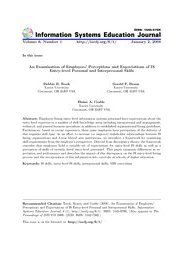Volume 6
Volume 6, Number 1 |
January 2, 2008 |
Abstract: Employers hiring entry-level information systems personnel have expectations about the entry-level expertise in a number of skill/knowledge areas including interpersonal and management, technical, and general business specialties, in addition to established organizational hiring guidelines. Furthermore, based on recent experience, these same employers have perceptions of the delivery of this requisite skill base. In an effort to increase (or improve) stakeholder relationships between IS hiring organizations and 4-year liberal arts institutions, we introduce a framework for examining skill requirements from the employer’s perspective. Derived from discrepancy theory, the framework concedes that employers hold a variable set of expectations for entry-level IS skills as well as a perception of skills of recently hired entry-level personnel. This paper examines differences in expectation and performance and describes the impact of this discrepancy on the IS entry-level hiring process and the incorporation of this information into curricula at schools of higher education.
Keywords: IS skills, entry-level IS skills, interpersonal skills, MIS curriculum
Download this issue: ISEDJ.6(1).Tesch.pdf (Adobe PDF, 16 pages, 807 K bytes)
Preview the contents: Tesch.c.txt (ASCII txt, 42 K bytes)
Recommended Citation: Tesch, Braun, and Crable (2008). An Examination of Employers' Perceptions and Expectations of IS Entry-level Personal and Interpersonal Skills. Information Systems Education Journal, 6 (1). http://isedj.org/6/1/. ISSN: 1545-679X. (A preliminary version appears in The Proceedings of ISECON 2006: §2733. ISSN: 1542-7382.)
